
Muswell Hillbillies is the tenth studio album by the English rock group the Kinks. Released in November 1971, it was the band's first album for RCA Records. The album is named after the Muswell Hill area of North London, where band leader Ray Davies and guitarist Dave Davies grew up and the band formed in the early 1960s.

Arthur (Or the Decline and Fall of the British Empire), often referred to as just Arthur, is the seventh studio album by the English rock band the Kinks, released in October 1969. Kinks frontman Ray Davies constructed the concept album as the soundtrack to a Granada Television play and developed the storyline with novelist Julian Mitchell; the television programme was never produced. The rough plot revolved around Arthur Morgan, a carpet-layer, who was based on Ray and guitarist Dave Davies' brother-in-law Arthur Anning.

Lola Versus Powerman and the Moneygoround, Part One, commonly abbreviated to Lola Versus Powerman, or simply Lola, is the eighth studio album by the English rock band the Kinks, recorded and released on 27 November 1970. A concept album, it is a satirical appraisal of the music industry, including song publishers, unions, the press, accountants, business managers, and life on the road. Musically Lola Versus Powerman is varied, described by Stephen Thomas Erlewine as "a wildly unfocused but nonetheless dazzling tour de force", containing some of Ray Davies's strongest songs.
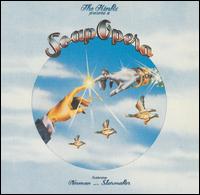
Soap Opera or The Kinks Present a Soap Opera is a 1975 concept album by the Kinks. It is the fourteenth studio album by the Kinks.

The Kinks were an English rock band formed in London in 1963 by brothers Ray and Dave Davies. They are regarded as one of the most influential rock bands of the 1960s. The band emerged during the height of British rhythm and blues and Merseybeat, and were briefly part of the British Invasion of the United States until their touring ban in 1965. Their third single, the Ray Davies-penned "You Really Got Me", became an international hit, topping the charts in the United Kingdom and reaching the Top 10 in the United States.

"Celluloid Heroes" is a song performed by the Kinks and written by their lead vocalist and principal songwriter, Ray Davies. It debuted on their 1972 album Everybody's in Show-Biz.
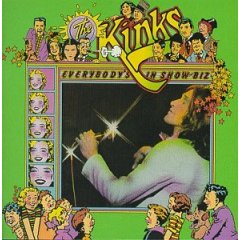
Everybody's in Show-Biz is the eleventh studio album released by the English rock group the Kinks, released in 1972. A double album, the first disc features studio recordings, while the second disc documents a two-night Carnegie Hall stand.
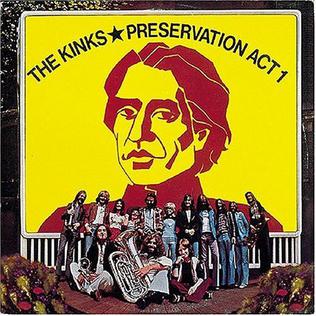
Preservation Act 1 is a concept album and the 12th studio album by the English rock group the Kinks, released 16 November 1973 by RCA Records.

Low Budget is the eighteenth studio album by English rock group the Kinks, released in 1979. Following the minor success of their 1978 album Misfits, the band recorded the majority of the album in New York rather than London. Unlike the more nostalgic themes of many Kinks albums prior to Low Budget, many of the album's songs allude to contemporaneous events. Musically, the album is a continuation of the band's "arena rock" phase, resulting in a more rock-based sound and more modern production techniques.

Misfits is the seventeenth studio album by the English rock band the Kinks, released in 1978. Following the minor success of Sleepwalker in the United States, Misfits featured a more rock-oriented style than many other Kinks records of the 1970s. Despite internal conflicts within the band, leading to both bassist Andy Pyle and pianist John Gosling quitting the band, the album made the Top 40 in America. The album also contained the minor hit single "A Rock 'n' Roll Fantasy", as well as less successful releases "Live Life" and "Black Messiah".
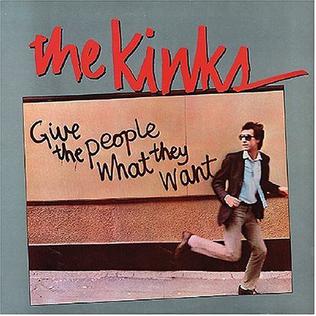
Give the People What They Want is the nineteenth studio album by the English rock group the Kinks. It was released in August 1981 in the US but not until January 1982 in Europe. It was delayed because lead singer Ray Davies wanted to produce a full-length video for the album but financing fell through. Also scrapped were plans to remix the album for the European market. It was initially aimed to be a statement on the media.
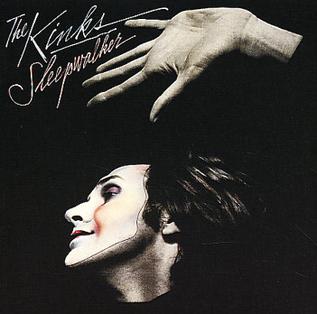
Sleepwalker is the sixteenth studio album by the English rock group, the Kinks, released in 1977. It marked a return to straight-ahead, self-contained rock songs after several years of concept albums. It is the first album in what critics usually call the "arena rock" phase of the group, in which more commercial and mainstream production techniques would be employed. The album also marks the last appearance of bassist John Dalton, who left the band during the recording sessions. Dalton plays bass on all songs on the album save for "Mr. Big Man". The lineup of the Kinks would be trimmed down significantly in 1977 following the album's release, as the brass section and backup singers were removed and the band returned to a standard rock band outfit.
"Wicked Annabella" is a song by the English rock band the Kinks from their 1968 album, The Kinks Are the Village Green Preservation Society (1968). Written by Ray Davies, it was recorded by the Kinks in July 1968. The song is Dave Davies's only lead vocal contribution on the album. It is one of several character studies on Village Green, recounting the wicked deeds of the local witch as a warning to children. Employing an eerie tone, its lyrics are darker than the rest of the album and have been likened by commentators to a dark fairy tale.

Preservation Act 2 is a 1974 concept album by the English rock band the Kinks, and their thirteenth studio album. It sold poorly, and received a mixed response among critics. Ken Emerson, in Rolling Stone, held out the album as an "underrated" one in the Kinks' repertoire.
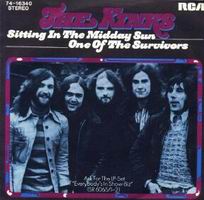
"Sitting in the Midday Sun" is a song by British rock band The Kinks, written by their frontman and main songwriter Ray Davies. It was recorded in June 1973 and released as a single in the US and UK the same year. Reviews were generally positive, but it failed to chart. "Sitting in the Midday Sun" was included on Preservation Act 1, released in November 1973. Act 1 peaked at number 177 on the US Billboard charts, but failed to make an impression on the UK charts.
"The Hard Way" is a song written by Ray Davies and first released by The Kinks on their 1975 album Schoolboys in Disgrace. It was also released on The Kinks live album One for the Road and on several greatest hits collections. The Knack covered the song on their 1980 album ...But the Little Girls Understand.

"I'm in Disgrace" is the opening track on the second side of The Kinks' 1975 concept album, Schoolboys in Disgrace. It was written by Ray Davies.

"No More Looking Back" is the penultimate track on The Kinks' 1975 concept album, Schoolboys in Disgrace. Like all of the other tracks on the album, it was written by Ray Davies.

"Everybody's a Star (Starmaker)" is the opening track on The Kinks' poorly received 1975 concept album, Soap Opera. It was written by The Kinks' primary songwriter, Ray Davies.

"She's Got Everything" is a song written by Ray Davies and released by English rock band the Kinks. It first appeared as the B-side of the Kinks' 1968 single, "Days".

















